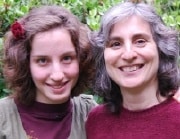A parent’s perspective
 Parents often are critical forces behind creating and successfully running Rosh Hodesh and Shevet groups.
Parents often are critical forces behind creating and successfully running Rosh Hodesh and Shevet groups.
When Margie Patlak heard about Moving Traditions’ Rosh Hodesh program several years ago, she decided to start a group for her daughter, Eva Chudnow, and her friends. Margie wanted to help the girls build strong Jewish female identities in the face of challenging messages from the media and society.
“Teenage girls are easily buffeted about by peer pressure and other social forces that take away their inner strengths, harm their self-esteem, and lead them into dangerous territory,” says Margie, a medical and health writer.
“I was concerned about Eva wanting to conform to something she wouldn’t feel comfortable with otherwise. I felt as if Rosh Hodesh offered a good centering point and a way of grounding.”
Although Margie and her husband, Frank Chudnow (a former Moving Traditions Board member), belong to Kol Ami near their home in suburban Philadelphia, the potential group of girls in the synagogue was too small to form a Rosh Hodesh group at the time. But they knew their daughter had close Jewish friends from school and camp who would make up a good group.
After attending a presentation by Moving Traditions about Rosh Hodesh and finding out that a regional arm of the local Jewish Federation was interested in sponsoring a group, Margie and another parent talked with their daughters and put together a list of girls they thought might be interested.
Getting started
“When we initially started calling parents of potential members, most people weren’t familiar with the program, but once we explained it they thought it sounded like a great idea,” recalls Margie.
“We invited about 20 girls and their parents to an introductory gathering, ran a sample meeting with the girls, and explained to the parents what the girls would get out of it. So many people were interested that we ended up forming two groups.”
A leader for each group was hired by the Federation and trained by Moving Traditions, and in the fall the girls started their meetings. Eva’s group completed five years in the program, and Eva praises the program and her group’s participants for making it something to look forward to every month.
Eva believes that her group had a strong group leader who started topics for the girls, and if they went off track, she helped to center them. “You get to learn about famous Jewish women who made a stand, and it gives you lots of ideas for yourself and how you can change the world. Plus you get to bond with other girls and do cool arts and crafts. It’s fun,” Eva said.
Measuring the benefits
So what does Margie think her daughter has gotten out of Rosh Hodesh over the years? Although she concedes that Eva occasionally responds to direct questions about her experiences with one-word answers in typical teenage fashion, she says she does see the program’s impact in ways even her daughter might not recognize.
“From time to time Eva will point out media images and the way some of them portray women, or she’ll share with me things on the internet that make fun of those images,” says Margie. “She’s also doing the leadership training curriculum now and has talked about that a bit. She definitely appears to take on more of a leadership role than some of her peers and seems to be really grounded.”
Eva articulates other benefits of participating in her Rosh Hodesh group –
“One thing I really like is that it has gotten me confident about myself as a girl in a way I don’t get from school or other places,” Eva says. “Usually you’re not connected with your Judaism after your bat mitzvah, but for me, it’s one of my biggest connections now. And it’s great that I get to see some of my camp friends every month since they don’t live that close to me.”
You can do it, too
Margie points out that the initial steps in getting a group together are not difficult and have their own rewards, with most parents expressing gratitude to those who help make it happen for their daughters.
“Once you get it off the ground, there isn’t much you have to do afterward,” she notes. “With the help of the group leader and the curriculum, the program uses Jewish teachings to encourage the girls’ inner strengths so they can emerge from their teen years self-confident, safe, and sound.”

